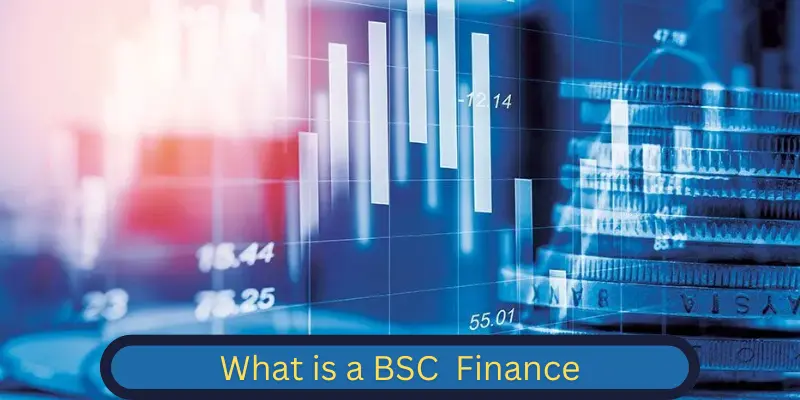BSC Finance | Detail Guide | Web Gege
Updated: 04 Apr 2025
BSC Finance is an exciting undergraduate program that opens doors to the world of money management, investments, and business strategy. This degree is perfect for anyone passionate about understanding how financial systems work and how businesses make informed financial decisions.
Finance plays a critical role in shaping the success of companies and the global market. Pursuing a BSc in Finance not only equips you with essential financial knowledge but also teaches you practical skills like budgeting, analyzing investments, and planning for future growth.
Whether you are dreaming of becoming a financial analyst, an investment banker, or starting your own business, a BSC Finance provides the strong foundation you need to achieve your goals. It is a versatile degree that combines theory with real world application, making it an excellent choice for students looking to thrive in the financial world.
What is a BSC Finance?
A Bachelor of Science in Finance (BSc Finance) is a university degree that focuses on teaching students how money works in businesses, markets, and the economy. It is a program designed for anyone interested in topics like investments, banking, risk management, and financial planning.
In this degree, you will learn how to analyze financial data, manage budgets, and make decisions that can impact companies and individuals. You will explore concepts like stock markets, corporate finance, and global trade, gaining a deep understanding of how financial systems shape the world around us.

What sets a BSC Finance apart is its practical approach. It not only gives you theoretical knowledge but also helps you build skills that you can directly apply in the real world like evaluating investment opportunities or understanding financial risks.
Whether you are aiming for a career in finance or simply want a better understanding of how money works, a BSC Finance provides you with the tools to succeed in a variety of roles, from financial analyst to investment advisor. It is the perfect degree for problem solvers and critical thinkers with an eye on the future.
You May Also Visit This Link: Best Rosa Gadget
Admission Requirements for a BSc Finance
Getting admitted to a Bachelor of Science in Finance (BSc Finance) program typically requires meeting a few key criteria. While these may vary between universities, here is a general idea of what most institutions look for:
1. Educational Background
You will need a high school diploma or equivalent qualification. Strong grades in subjects like mathematics, economics, or business are usually recommended, as these provide a solid foundation for the program.
2. Minimum Grades
Many universities have specific grade or GPA requirements for admission. For example, you might need a certain percentage in your final exams or a competitive SAT/ACT score if you are applying in the United States.
3. Language Proficiency
If you are applying to an international program where the courses are taught in English, you may need to prove your proficiency in English. This is often done through tests like IELTS or TOEFL.
4. Personal Statement or Essay
Some programs require you to write an essay or personal statement explaining why you want to study finance and how it aligns with your goals. This is your chance to stand out!
5. Interview (Optional)
In certain cases, universities may conduct interviews to understand your motivation and assess your suitability for the program.
6. Application Deadlines
Make sure you check the deadlines for submitting your application and all supporting documents, as late submissions are often not accepted.
You May Also Visit This Link: Rs 149 Bear Design Long-Sleeve Baby Jumpsuit Thespark Shop
Fees and Funding for a BSc Finance
When planning to study a BSC Finance, one important factor to consider is the cost. The fees for this degree can vary depending on the university and the country where you study. However, here is a general idea of what you can expect:
1. Tuition Fees
Tuition fees for a BSC Finance are typically charged annually and can differ greatly. For example:
- In the UK, fees can range from £10,000 to £30,000 per year for international students, while UK and EU students might pay less.
- In the US, tuition can range from $20,000 to $50,000 per year, depending on whether you attend a public or private university.
- Some universities in countries with low cost education, like Germany or Canada, might charge more affordable fees.
2. Additional Costs
Besides tuition fees, there may be additional costs such as:
- Books and supplies: Financial textbooks or software for assignments.
- Living expenses: Including accommodation, food, transport, and personal expenses.
3.Scholarships and Grants:
Many universities offer scholarships and grants to help reduce the cost of tuition. These can be based on merit, financial need, or specific fields of study. Be sure to check with the university admissions department to find out what funding options are available. Some popular funding options include:
- Merit based scholarships: Awarded for academic achievements.
- Need based grants: For students with financial difficulties.
- External scholarships: From organizations or governments that support international students or students pursuing finance.
4. Student Loan:
If you cannot cover all your costs upfront, student loans might be an option. Many governments and banks offer loans that can help finance your education. These loans typically have lower interest rates for students.
5.Part Time Work:
As a student, you might be able to work part time to help cover living expenses. Many countries allow international students to work up to a certain number of hours per week during term time. It is important to research all available funding options early, so you can find the right fit for your financial situation and plan your budget accordingly.
Why Pursue a BSC Finance
A BSc in Finance is a great choice for students who are interested in money, business, and problem solving.

Here are some key reasons why this degree could be perfect for you:
1.Wide Range of Career Opportunities:
Finance is an essential part of almost every industry, from banking and investments to technology and government. With a BSc in Finance, you will be qualified for jobs like:
- Financial Analyst
- Investment Banker
- Accountant
- Risk Manager
- Financial Planner
The possibilities are endless, and you will have the opportunity to choose a career that matches your interests and goals.
2.High Earning Potential:
Many finance careers offer competitive salaries. Graduates with a BSc in Finance often earn higher starting salaries compared to graduates in other fields. Over time, your earning potential can increase as you gain experience and progress in your career.
3.Job Security and Stability:
Finance is a field that is always in demand, no matter the state of the economy. Companies need financial professionals to manage their money, investments, and risks, meaning job opportunities are plentiful. With a BSc in Finance, you will be entering a field with long term stability.
4.Develop Valuable Skills:
A BSc in Finance teaches you more than just numbers. You will develop critical thinking, problem solving, and analytical skills that are highly valued by employers. These skills can be used not only in finance but across any industry.
5.Understanding the World Around You:
Finance affects everything in our daily lives. Whether you are looking at how governments spend money, how companies grow, or how individuals invest for the future, having a background in finance helps you better understand the world is financial systems. This knowledge is valuable both professionally and personally.
6.Opportunities for Growth and Specialization:
As a finance professional, you can specialize in areas like corporate finance, investment banking, risk management, or financial planning. You can also pursue advanced degrees or certifications to further boost your expertise and career potential. The world of finance is full of opportunities to grow.
You May Also Visit This Link: The Spark Shop – Online Shopping Big Discount
Top Universities Offering BSc Finance
When choosing where to pursue your BSc in Finance, it is important to select a university with a strong reputation for finance related programs. Here are some of the top universities around the world that offer excellent BSc Finance programs:
1. London School of Economics (LSE), UK
The London School of Economics is one of the world is leading institutions for finance education. Known for its rigorous academic curriculum and strong links to the global finance industry, LSE provides students with a comprehensive understanding of finance and great networking opportunities.
2. University of St. Andrews, UK
St. Andrews offers a BSc in Economics and Finance, which is perfect for those looking to combine a strong foundation in economics with practical finance knowledge. The university is renowned for its academic excellence and its picturesque coastal campus.
3. University of Pennsylvania (Wharton), USA
The Wharton School at the University of Pennsylvania is famous for its finance program. Known for its world class faculty and close connections to major financial institutions, Wharton is an excellent choice for students wanting to kick start a career in finance.
4. New York University (NYU), USA
Located in the heart of New York City, NYU offers a strong BSc Finance program through its Stern School of Business. Students benefit from being in one of the world is financial hubs, providing valuable internships and job opportunities after graduation.
5. National University of Singapore (NUS), Singapore
NUS is one of Asia is top universities and is known for its exceptional BSc in Finance program. Students here gain a global perspective and learn from experts in Asia booming finance sector, preparing them for international career opportunities.
6. University of Melbourne, Australia
The University of Melbourne offers a Bachelor of Commerce with a major in Finance, which is highly regarded in the Asia Pacific region. Melbourne program focuses on global finance while providing a mix of theory and practical skills.
7. ETH Zurich, Switzerland
ETH Zurich is known for its strong academic programs in finance, economics, and technology. The university BSc in Finance emphasizes financial theory and quantitative analysis, making it ideal for students looking to get into areas like risk management and financial engineering.
8. University of Hong Kong (HKU), Hong Kong
HKU offers a BSc in Finance that provides students with an understanding of finance in Asia and beyond. The program combines strong theoretical foundations with practical experience, preparing students for a variety of careers in the financial services industry.
9. IE University, Spain
IE University BSc in Economics and Finance offers an innovative curriculum that blends economics, business, and finance, all within an international context. Located in Madrid, the university strong connections with global finance companies make it a great choice for students wanting to work in finance worldwide.
10. HEC Paris, France
HEC Paris offers an excellent BSc program in Economics and Finance, known for its top tier faculty and emphasis on real world finance skills. The program is highly competitive, and the university has one of the best alumni networks in the world, which is valuable for career advancement.
You May Also Visit This Link: Rs 125 Only on Thespark Shop Men Jackets
Advantages and Disadvantages of BSC Finance
A BSc in Finance offers career opportunities with good salary potential, but can be challenging due to intense coursework and job market competition.
| Pros |
|---|
|
| Cons |
|---|
|
Common FAQs about BSC Finance
Common FAQs about BSc Finance include career options, job opportunities, salary potential, course difficulty, and further study options after graduation:
A BSc in Finance opens up many career opportunities. Graduates can work as financial analysts, investment bankers, accountants, risk managers, or financial planners. The degree also provides a solid foundation for higher studies like an MBA or other financial certifications.
Typically, a BSc in Finance takes around three to four years to complete, depending on whether you attend a full time program or a part time course. Some universities also offer accelerated programs that can be completed in less time.
Not necessarily, most BSc Finance programs are designed to teach you everything from the basics, so you do not need prior knowledge of finance. However, having a strong foundation in mathematics, economics, or business can be helpful.
A BSc in Finance can be challenging as it involves studying complex topics like financial markets, accounting, economics, and statistical analysis. However, if you have a strong interest in numbers and problem solving, you will likely find it rewarding and manageable.
Throughout the course, you will develop valuable skills such as critical thinking, data analysis, financial modelling, decision making, and problem solving. These skills are not only useful in finance but are also valuable in many other industries.
To be admitted, you generally need a high school diploma or equivalent, with strong grades in subjects like mathematics and economics. Some universities may also require you to submit an application essay or go through an interview process.
The cost varies depending on the country and university. Tuition fees can range from a few thousand dollars to over $40,000 per year. You should also consider additional costs like textbooks, accommodation, and living expenses.
Yes, many students work part time while studying, especially during the summer breaks. Some universities even offer internships or work placements that give you valuable experience in the finance industry. However, be mindful of balancing work and your studies.
Yes, if you are interested in a career in finance, economics, or business, a BSc in Finance is definitely worth it. It provides great job prospects, high earning potential, and a diverse range of career options. However, it requires hard work, commitment, and a genuine interest in the financial world.
Bonus Points about BSC Finance
Here are some extra points that can make a BSc in Finance even more attractive:
- Global Recognition: Finance is a universal field, meaning that a BSc in Finance from a reputable university is recognized worldwide. No matter where you go, your degree will help you find opportunities in global financial markets.
- Exposure to Real World Finance: Many universities offer internship opportunities or work placements as part of the program. These real world experiences give you the chance to apply what you have learned, build connections, and enhance your resume before even graduating.
- Strong Alumni Networks: Top universities often have strong finance alumni who can provide guidance, mentorship, and career connections. Being part of this network can help you find internships, jobs, and build valuable professional relationships.
- Flexibility of Careers: A BSc in Finance is not just for those who want to work in banking or investment firms. Many companies in industries like technology, consulting, real estate, and even government need finance experts. This flexibility gives you the freedom to explore a variety of career paths.
- Learning Opportunities for Personal Finance: Along with professional skills, a BSc in Finance gives you valuable tools for managing your own money. You will learn about budgeting, investing, saving, and planning for the future, which can benefit your personal financial decisions.
- Pathway to Specializations: The finance field offers many areas of specialization, like corporate finance, risk management, investment banking, or financial analysis. A BSc in Finance gives you the foundation to dive deeper into any of these areas, making you more competitive in your career.
- Highly Valued Degree by Employers: Finance graduates are in high demand across the globe, as financial knowledge is essential to businesses and organizations of all sizes. Having a BSc in Finance means you will be highly sought after by employers looking for professionals with strong financial and analytical skills.
- Opportunities to Work in Exciting Financial Hubs: Finance jobs are often located in exciting global financial hubs like New York, London, Hong Kong, and Singapore. These cities offer fast paced work environments and a wide range of professional growth opportunities.
- Personal Growth & Confidence: Studying finance builds confidence as you learn how to solve complex problems and make decisions based on data and analysis. Over time, you will become more comfortable with your problem solving abilities, critical thinking, and teamwork.
- Diverse Study Areas: A BSc in Finance covers a variety of subjects, such as accounting, investment analysis, financial modelling, economics, and corporate finance. This wide range of topics provides you with a comprehensive understanding of the financial world, allowing you to become well rounded in the field.
Conclusion
A BSc in Finance is an excellent choice for anyone interested in understanding how money works in both businesses and the global economy. The degree offers valuable skills in financial analysis, decision making, and problem solving, which can open the door to a wide range of career opportunities in industries like banking, investment, and consulting.
With strong earning potential, job stability, and global career prospects, a BSc in Finance provides a solid foundation for success in the world of finance. The skills you develop are not just limited to professional settings but also help in making smart personal financial decisions.
While the program can be challenging, especially for those without a strong background in math or economics, it is highly rewarding for those with a genuine interest in financial systems. Whether you want to specialize in areas like investment banking or risk management or explore other industries, this degree offers the flexibility to follow many career paths.
You May Also Visit This Link: Rs 125 Only on Thesparkshop.in Batman Style Wireless BT Earbuds





